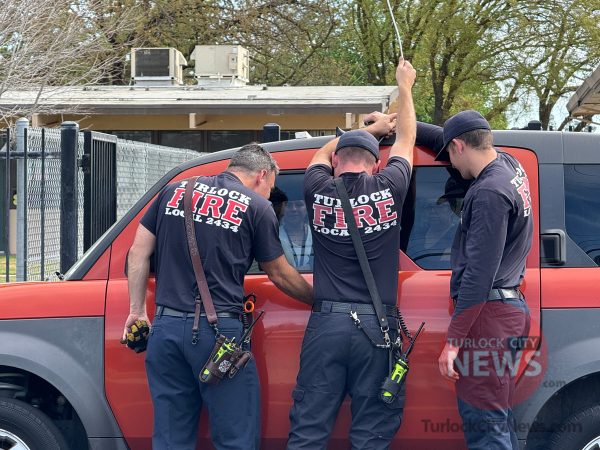California State University, Stanislaus will make a new commitment to writing skills, President Joesph Sheley said in his annual address.
Good writing is the foundation of liberal arts and science learning, he said, enhancing critical thinking, composition, and exposition. And, employers say, writing ability often clinches a hiring or promotion decision.
Yet the skill is in decline. No longer will CSU Stanislaus tolerate that decline, Sheley said, making a commitment to improve students' writing skill and instill writing as an important lifelong practice.
“Let's pledge to move students' writing up a notch,” Sheley said, making his first address since dropping the “interim” from his title of president. “Move a student from the C to the B level as a writer. Hone the B writer into an A.”
The commitment extends to faculty, staff, and administrators, Sheley said. And even employers are asked to make clear the importance of writing skills to potential new hires.
This regional commitment to writing could reverberate nationally, Sheley said.
“What if, five years from now, CSU Stanislaus – and by extension, the region itself – were known for its commitment to writing?” Sheley asked. “A place where writing is not a box to check or a hoop to jump through, but an institutional signature known far and wide.”
In order for that reputation to spread, though, CSU Stanislaus needs advocates, Sheley said. The university will rebuild its advocacy and advancement functions, but spreading the word will take the help of alumni, civic leaders, and employers too.
“We can't wait, we cannot afford to wait around for others to discover what we do well,” Sheley said. “I noted last year that it was time to stop being so modest – we can talk publicly about our accomplishments and the difference our graduates make in their communities. We can state with pride that our region matters and CSU Stanislaus matters. I can't believe how little people brag and how much they have to brag about.”
Sheley lauded the broad foundational education CSU Stanislaus students receive, allowing them to slot into any job regardless of major. He pointed to CSU Stanislaus graduates Turlock Mayor John Lazar, a speech and political science major who is now a Realtor, and Bistro 234 owner Jennifer Bethel, an English major, as examples.
“These folks are notable, but they are not alone, and not by a long shot,” Sheley said. “In every business I visit, including our own campus, employers tell me about our smart, practical, adaptable graduates
It's the foundational education, Sheley said, that teaches all students crucial skills like critical thinking, comprehension, communication, problem solving, and problem identification.
But CSU Stanislaus can do better, Sheley noted, pushing for a stronger emphasis on student advising to help the more than 50 percent of students who are the first in their families to go to college. Sheley also asked administrators, faculty, and staff to all reach out to at least one student and serve as a mentor, challenging alumni and student leaders to do so as well.
“Nothing tricky, no special training required – just proactively be there for someone,” Sheley said. “It really could be that simple.”
Sheley rejoiced that voters passed Prop 30 last year, creating additional funding for the CSU system. But the short duration of the extra funding means that CSU Stansislaus must act now to secure its future.
“We are not out of trouble,” Sheley said. “Prop 30 simply calmed the waters temporarily; it will be revisited in four years. Expect four years to go quickly.”
In the short term, Sheley expects enrollment to increase 2.4 percent this year, while making some long-needed new hires. The hiring process will be done “strategically,” Sheley said, focusing on priorities and saving money where possible to create a financial reserve.
Sheley called for long-term planning, continuing a new budget process implemented this year. That process saw the vice presidents of the CSU Stanislaus schools work together to draft – and agree on – a list of overall university funding priorities.
“If you understand universities, you know that this is practically unheard of to approach it this way,” Sheley said. “And you know what, they did it!”
The funding plan was then vetted by the University Budget Advisory Committee in a collaborative process, involving staff and faculty throughout. Previous CSU Stanislaus President Hamid Shirvani was criticized, for his unilateral decisions and ignoring budget feedback from the campus community.
Sheley hopes to conduct more planning this year, asking Provost James Strong to chair an effort to rewrite the university's strategic plan, which has not been updated since 2008. The realities of state funding have changed drastically since 2008, Sheley noted, necessitating a new plan.
“We need to make certain our stated mission remains relevant and inclusive, and that we stay true to it. Our goals must be clear and achievable, or the plan will do nothing but gather dust. It must be practical, there's no sense in blue-skying it, with a clear sense of where we are going in the near future. Our new plan will shape our direction, influence our priority-setting, and provide the standard against which we measure our progresss.”
Though CSU Stanislaus is not completely in the clear yet, the university is on the right track, Sheley said. And through a dedication to what the university does well – and writing – CSU Stanislaus can continue to be known as an outstanding institution of higher learning.
“Our financial challenges remain, and we will see them through together,” Sheley said “We are many people, with many histories, ideas, needs and interests. But if we are unified in our goals, we also will be unified in our achievements.”







